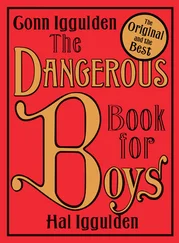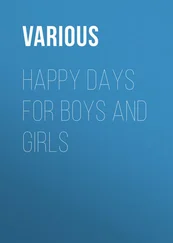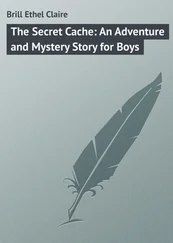Robert Robert - Scouting for Boys
Здесь есть возможность читать онлайн «Robert Robert - Scouting for Boys» весь текст электронной книги совершенно бесплатно (целиком полную версию без сокращений). В некоторых случаях можно слушать аудио, скачать через торрент в формате fb2 и присутствует краткое содержание. Жанр: Старинная литература, und. Описание произведения, (предисловие) а так же отзывы посетителей доступны на портале библиотеки ЛибКат.
- Название:Scouting for Boys
- Автор:
- Жанр:
- Год:неизвестен
- ISBN:нет данных
- Рейтинг книги:3 / 5. Голосов: 1
-
Избранное:Добавить в избранное
- Отзывы:
-
Ваша оценка:
- 60
- 1
- 2
- 3
- 4
- 5
Scouting for Boys: краткое содержание, описание и аннотация
Предлагаем к чтению аннотацию, описание, краткое содержание или предисловие (зависит от того, что написал сам автор книги «Scouting for Boys»). Если вы не нашли необходимую информацию о книге — напишите в комментариях, мы постараемся отыскать её.
Scouting for Boys — читать онлайн бесплатно полную книгу (весь текст) целиком
Ниже представлен текст книги, разбитый по страницам. Система сохранения места последней прочитанной страницы, позволяет с удобством читать онлайн бесплатно книгу «Scouting for Boys», без необходимости каждый раз заново искать на чём Вы остановились. Поставьте закладку, и сможете в любой момент перейти на страницу, на которой закончили чтение.
Интервал:
Закладка:
The letters appear this way as you face the sender
If you want to write a dispatch that will puzzle most people to read, use the Morse or Semaphore letters in place of the ordinary alphabet. It will be quite readable to any of your friends who understand signalling.
COMMANDS AND SIGNALS
A Patrol Leader often has a whistle, and a lanyard or cord for keeping it. The following commands and signals should be at your fingers’ ends, so that you can use them in your Patrol:
Words of Command
“Fall in” (in line).
“Alert” or “Attention” (stand up smartly). “Easy” or “At ease” (stand at ease).
“Sit easy” or “Sit at ease” (sit or lie down without leaving the ranks).
“Dismiss” (break off).
“Right turn” (or left turn); (each Scout turns accordingly).
“Patrol right turn” (or left turn); (each Patrol with its Scouts in line wheels to that hand).
“Quick march” (walk smartly, stepping off on the left foot).
“Double” or “On the double” (run at smart pace, arms hanging loose).
“Scout Pace” (walk so many paces and jog so many paces alternately—about 50 of each).
Whistle Signals
When a Scoutmaster wants to call the Troop together he whistles “The Scout’s Call”, or uses a special Troop call.
Patrol Leaders thereupon call together their Patrols by giving their Patrol call. Then they take their Patrol “on the double” to the Scoutmaster.
Here are some whistle signals for Scout field games:
1. One long blast means “Silence”, “Alert”, “Look out for my next signal”.
2. A succession of long, slow blasts means “Go out”, “Get farther away”, or “Advance”, “Extend”, “Scatter”.
3. A succession of short, sharp blasts means “Rally”, “Close in , “Come together”, “Fall in”.
4. A succession of short and long blasts alternately means “Alarm”, “Look out”, “Be ready”, “Man your alarm posts”.
5. Three short blasts followed by one long one from Scoutmaster calls up the Patrol Leaders—i.e., “Leaders come here!”
Any signal must be instantly obeyed at the double as fast as you can run—no matter what other job you may be doing at the time.
Hand Signals
Hand Signals—which can also be made by Patrol Leaders with their Patrol flags when necessary: Hand waved several times across the face from side to side, or flag waved horizontally from side to side opposite the face means “No”, “Never mind”, “As you were".
Hand or flag held high, and waved very slowly from side to side, at full extent of arm means “Extend”, “Go farther out”, “Scatter”.
Hand or flag held high, and waved quickly from side to side at full extent of arm means “Close in”, “Rally”, “Come here”.
Hand or flag pointing in any direction, means “Go in that direction".
Clenched hand or flag jumped rapidly up and down several times, means “Run”. Hand or flag held straight up over head, means “Stop”, “Halt”.
When a leader is shouting an order or message to a Scout who is some way off, the Scout, if he hears what is being said, should hold up his hand level with his head all the time. If he cannot hear, he should stand still, making no sign. The leader will then repeat louder, or beckon to the Scout to come in nearer.
Make up your own signals for other commands to your Patrol.
PATROL PRACTICES IN SIGNALLING
Practice laying, lighting and use of signal fires of smoke or flame. Practice whistle and drill signals.
Have a competition in the Patrol in concealing dispatches on the person: Give each Scout a small piece of paper and allow him to hide it on himself. Pair Scouts off and let each search the other. The one whose paper takes longest to find is winner.
Each Patrol invents its own secret code. The other Patrols try to decipher it.
Patrols compete in finding most ingenious way of sending a Morse message without use of special apparatus.
All signalling practices should be as real as possible. From the beginning separate letters can be sent and read across as wide a space as may be available, preferably out-of-doors.
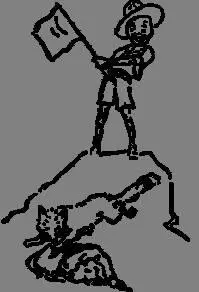
Here is an English sentence you can use for practice in signalling: “The quick brown fox jumps over the lazy dog”. It contains all the letters of the alphabet.
GAME IN MESSAGE CARRYING
Dispatch Running
A Scout is chosen to carry a dispatch to a “besieged” place—which may be a real village, farm or house, or someone stationed at an appointed spot. The dispatch-runner must wear a coloured rag, at least two feet long, pinned to his shoulder, and with this in its proper place he must reach
his goal.
The enemy besieging the place must prevent him reaching it, but cannot, of course, go within the lines of the supposed defenders, that is, within 300 yards of the besieged place—boundaries for this should be decided upon beforehand. Anyone found within that limit by the umpire will be ruled out as shot by the defenders.
To catch the dispatch-runner the enemy must take the rag from his shoulder. They know he starts from a certain direction at a certain time— the spot should be a mile or so from the besieged town—and they may take any steps to capture him they like, except that they may not actually witness his departure from the starting-place.
The game may be played in a town with two houses chosen as starting-place and besieged town respectively, and the dispatch-runner can adopt any disguise (except that of a woman), as long as he wears the rag pinned to his shoulder.

The people of old had their own signals. Here’s one that has meant “Attention” through all ages.
CHAPTER III
CAMP LIFE
CAMP FIRE YARN NO. 8
PIONEERING
Knot Tying — Hut-Building — Felling Trees — Bridging — Self-Measurement
Judging Heights and Distances
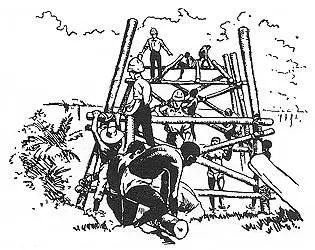
Pioneers are men who go ahead to open up a way in the jungle or elsewhere for those coming after them. When I was on service on the West Coast of Africa, I had command of a large force of native scouts, and, like all scouts, we tried to make ourselves useful in every way to our main army, which was coming along behind us. We not only looked out for the enemy and watched his moves, but we also did what we could to improve the road for our own army, since it was merely a narrow track through thick jungle and swamps. So we became pioneers as well as scouts. In the course of our march we built nearly two hundred bridges over streams, by tying poles together.
But when I first set the scouts to do this important work I found that, out of the thousand men, a great many did not know how to use an axe to cut down trees, and, except one company of about sixty men, none knew how to make knots — not even bad knots.
Saving Life with Knots
Just before I arrived in Canada a number of years ago, an awful tragedy had happened at the Niagara Falls.
It was mid-winter. Three people, a man and his wife and a boy of seventeen, were walking across a bridge which the ice had formed over the rushing river under the falls, when it suddenly began to crack and to break up. The man and his wife found themselves on one floe of ice floating away from the main part and the boy was on another.
Читать дальшеИнтервал:
Закладка:
Похожие книги на «Scouting for Boys»
Представляем Вашему вниманию похожие книги на «Scouting for Boys» списком для выбора. Мы отобрали схожую по названию и смыслу литературу в надежде предоставить читателям больше вариантов отыскать новые, интересные, ещё непрочитанные произведения.
Обсуждение, отзывы о книге «Scouting for Boys» и просто собственные мнения читателей. Оставьте ваши комментарии, напишите, что Вы думаете о произведении, его смысле или главных героях. Укажите что конкретно понравилось, а что нет, и почему Вы так считаете.

![Роберт Баден-Пауэлл - Искусство скаута-разведчика[Scouting for boys ; Искусство Разведки для мальчиков]](/books/70572/robert-baden-pauell-iskusstvo-skauta-thumb.webp)



